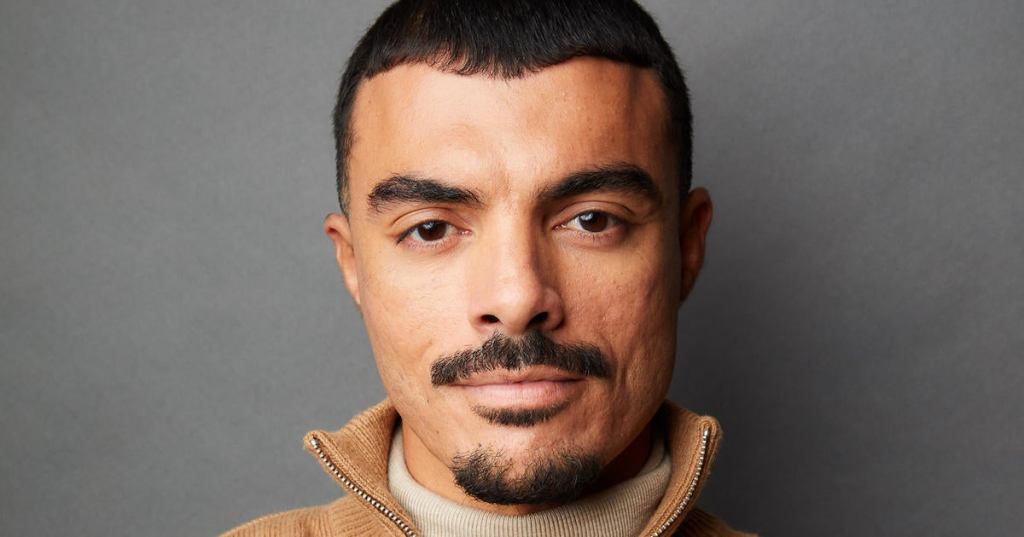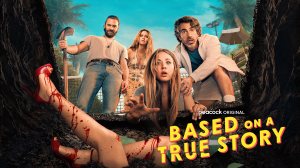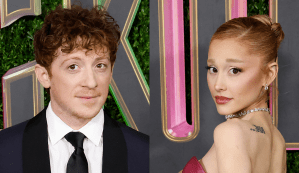Stephen Speilberg’s remake of the musical romantic drama film West Side Story is here and Broadway veteran, Yurel Echezarreta, couldn’t be happier to have a role in the beloved classic. Echezarreta had already been in several major Broadway productions for over a decade, including a 2008 run of West Side Story in New York, before he began making the transition from the stage to the big and small screen. After getting the call from his agent that Speilberg was behind a remake, it was a no-brainer for him to audition.
His resume is impressive, having had roles in La Cage Aux Folles, Matilda!, Disney’s Aladdin, and most recently Tony-winning Moulin Rouge!. Echezarreta has been deemed a “standout performer” with “sleek dance moves” by Entertainment Weekly for his performance in Head Over Heels. Now, he is ready to show the world what he has to offer on-screen. And as a Cuban American who is a triple threat in singing, dancing, and acting, Echezarreta is excited to be part of the broader expansion of diversity in casting both on-stage and on the screen.
Videos by PopCulture.com
Pop Culture spoke with Echezarreta about making the move from the stage to the screen and how West Side Story is a full-circle moment for him. He also gives a preview into other projects he has in motion. The Speilberg production is in theaters now.
PC: We know that you’re in the new Steven Spielberg production of West Side Story. You were in the Broadway musical in 2008. So, obviously, this is sort of a full-circle moment for you, especially being in a Spielberg production. Can you tell me a little bit about your journey and how this came to be?
YE: I had already been living about 10 years in New York City. I had been in five Broadway shows at that point. I believe I got the audition through my agent. And luckily, I was already taking film and television classes, getting those chops up. So I was able to get the material coached with my acting teacher and it was wild.
I had three auditions, and it was really interesting because the rehearsal process was like a hybrid. It was part Broadway musical audition and part TV film camera audition, and wild to have Steven Spielberg right there – listening to me sing, watching me act, watching me dance – and he was there with his own camera, even during the dance rehearsals. But during the acting rehearsals, he was sitting there and he brought in a full cameraman with a massive camera, right next to our faces doing that close-up work, film work, in this kind of Broadway musical audition setting.
And then the dancing – we did group dancing to different numbers. “America” was one of them. I believe we did some prologue and then they would start to pull us that they became interested in to do solo auditioning for the dance where they gave us very specific notes to take and try to apply in the moment and to challenge us and see if we were able to adapt. So that was really interesting and different because usually for Broadway auditions, the smallest you’ll get is a group of two or three. So to go in solo to dance for the whole team was really cool and different and exciting and scary and challenging.
And then the singing was pretty standard. We sang, there was a camera off to the side recording us, and we sang for the creative team, the producers. I think after three auditions and after a month’s time, I was informed that I booked it, and it was just amazing news.
Well, congratulations on that. One of the things that I’ve always been interested in is someone who’s been able to transition from musical productions or major Broadway productions to television and film. And because you had already had the experience in West Side Story and you are familiar with it – you know the songs, you know the story, you know the routines – but what differences have you noticed between being a part of a production on stage and then transitioning that to having to audition and perform it in a film. Everything on stage appears to be more dramatized.
That’s the thing. It’s like on stage, you have to perform to a whole audience. Sometimes up to 2,000 people. And that requires a certain energy and animation to be able to send the story out to the back rows like that.
And obviously, for TV/film, it’s a whole different beast. The camera’s up in your face where people can smell phony from one frame to the next. So you have to really be engaged, really be living in the moment. And luckily, for film, it’s not that you can’t be big in your actions and animation, but it has to be justified with the circumstances and of what’s happening. Then you are safe to be able to show subtle thoughts in your face, when it calls for subtlety, when it calls for lower energy, when it calls for more intimacy. Filming TV, you can never not be in the moment because the audience will be able to see it.
Another thing that I wanted to get into was this whole idea of diversity. And one of the things that I’ve noticed just being a Broadway fan is that with stories like West Side Story or stories that involve people of color primarily, a lot of times a lot of the actors hired for these productions, whether they’re on Broadway or film and television, aren’t necessarily representative of the characters in terms of their ethnic backgrounds. But you’ve been lucky enough as a Cuban American to really exemplify these characters in these roles. How paramount do you feel like true diversity is within, with the images that we’re seeing on television and on stage?
I think it’s important because there is an authenticity; there is a cultural energy that can only come from the people that were raised in that energy. And especially when it comes to a story like this, where it is about a white gang, a Polish gang, and a Puerto Rican gang – you need to be able to call upon those different cultural expressions and energies.
I just think it enriches it if you hire authentically. And just culturally speaking, I think it’s important to be sensitive right now. We are in the space now where we’re really trying to honor people’s authenticities and humanness, and I think it’s in a really important time to be doing that. And I think they did a really good job.
We are diverse in our Latino heritage for the movie. But they brought in a Puerto Rican coach to train us in dialect and in slang. And we really did our very best to be as authentic to the Puerto Rican culture as we could, and a few of our cast members, shark cast members in the Puerto Rican gang, were born in Puerto Rico. So we were actually able to help each other and support each other through the authentic journey.
Are there conversations that are had behind the scenes within Broadway productions – because I know that that’s primarily where your work has been – and obviously in film and television now there’s a huge push behind the scenes for diversity and making sure, like you mentioned, that there’s that authenticity aspect, as far as casting is concerned. Are those same conversations being had is it the same push in the Broadway world?
I believe they’re trying very much. And I know that there are diversity meetings happening. There is training happening to make sure that everyone feels supported and represented and heard. I think it’s going to take a little while for that desire to really reach the core of the industry, but there are definitely cast meetings happening. There are definitely people of color being hired in higher positions in companies. And I think the conversations are happening. I think people of color are feeling safer to verbalize their issues and their desires and feel safe that they won’t be looked down upon or judged or penalized for expressing that. And so, I think there is change happening in the Broadway community. I think it’s going to be a slow process, just like everywhere and in every industry. But I think change is slowly happening.
And what made you specifically want to be a part of this project? What are you most excited for viewers to see about this film?
I think I’m most excited for people to go on the journey. I think Steven Spielberg, it’s like he has created an adventure ride where as soon as the movie starts, you dive into this world, New York City in the 50s, in the cultural climate and the political climate and the rawness and realness of New York City at that time. And then once you’re on that ride, you really see the example of what happens when people go against each other and challenge each other and fight each other and don’t really listen to each other. In this story, these two gangs actually want a lot of the same things, but they can’t see beyond their cultural differences, beyond the color of their skin.
And it even touches on topics of tension and dynamic differences within the Latino community. So I think not only are you going to go on a ride of adventure, but you’re going to learn about that time more than ever, and more than in any other West Side reincarnation. So I think you get a double whammy for the movie.
And congratulations again on being able to make the transition. Your Broadway resume has been expansive, but there’s always more to dream about. So what is your next dream for the stage or for film and television – or all of it [combined]?
I am open to all of it, but I am really focusing in on TV and film. I filmed two independent films this year, actually three, I played a gay MMA fighter, the antagonist in this film called I’m Not Gay, and it’s an independent film coming out next year. So that was really exciting. And I had a small role in a Lionsgate film that’s also coming out next year. So, I’m well on my way.
My dream is to become a series regular in a fun TV show or dramatic TV show – or a substantial character in a major budget film. So that’s where I’m putting my energy and I’m glad I have some material coming out next year to help along with that push. I have another little project coming up that I’m not able to speak on yet, but if people want to follow me on Instagram @Yurele, I’ll be able to keep everyone posted via that. That’s that platform.





